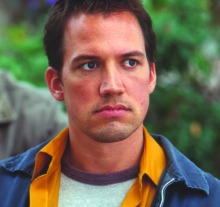|
Dopamine
|
| |
 |
USA, 2003. Rated R. 79 minutes.
Cast:
John Livingston, Sabrina Lloyd, Bruno Campos, Rueben Grundy, William Windom,
Nicole Wilder
Writers: Mark Decena, Timothy Breitbach
Original Music: Eric Holland
Cinematography: Rob Humphreys
Producers: Debbie Brubaker, Tad Fettig
Director: Mark Decena
LINKS
|
"Love and Happiness…can make you do right…make
you do wrong…make you come home early…make you stay out all night long…the
power of Love…Uh."
—Al Green, Soul Music Deity
"My hypothalamus is in overdrive."
—"Rand," protagonist of Dopamine
 e have
all been here. We meet someone. There is an inaudible, mutual "click." Then
suddenly, we cannot get enough of them. They penetrate our thoughts at the most
curious times—during meetings, in traffic, in the frozen food isle. We
remember the songs they say they like and then listen to them repeatedly. We
adopt their activities—activities we once ridiculed and swore we would
never do—rollerblading, video game playing, Jazz café frequenting, reading
Valley of the Dolls, watching Battlefield Earth.
e have
all been here. We meet someone. There is an inaudible, mutual "click." Then
suddenly, we cannot get enough of them. They penetrate our thoughts at the most
curious times—during meetings, in traffic, in the frozen food isle. We
remember the songs they say they like and then listen to them repeatedly. We
adopt their activities—activities we once ridiculed and swore we would
never do—rollerblading, video game playing, Jazz café frequenting, reading
Valley of the Dolls, watching Battlefield Earth.
We crave their smell. We dismiss any negative aspect of their personality,
chalking it up to their idiosyncratic splendor. Whether we are doctors, truck
drivers, or writers, when we think we are "falling in love," we collectively
regress. All training, education, and pragmatism are stripped away, and boom!
We are but 5-year olds on the playground again, waiting for Johnny or Suzie
to make us one more mud pie.
There are two paradigms that speak to this "whacked over the head" behavior.
There are of course the Romantics. To them, love is and should be a mystery.
Any attempt to qualify it, quantify it, or otherwise explain it away is futile.
Further, if you are unwilling to surrender to it, you are never going to truly
experience it and are basically dead on the inside.
Others seek to explain the above activity empirically. Scientists have researched
the physiological activity of people falling in "love." According to their findings,
it is neither magic, nor mystery, but a series of neurological reactions that
deliver a certain high. It is ultimately this high that we are chasing, rather
than our latest Her or Him. Happiness and Love are essentially Norepinephrine
and Dopamine.
Dopamine, the film, seeks to explore both sides of this "love debate"
though the professional and personal life of Rand (John Livingston). Rand lives
in San Francisco, where he is a partner in a 3-D animation startup. Rand shares
his small, office space with fellow partners, Winston (Bruno Campos)—an
attractive and brazen lothario—and Johnson (Rueben Grundy)—whose Zen-like
demeanor is a nice balance for the creative team. The three characters transparently
comprise the human ethos of Id, Ego, and Superego.

John Livingston stars in Dopamine. |
As is the nature of the small company, the sleep-deprived partners have been
working like fiends on their only project, for their only client: A 3-dimensional
bird named Koy-Koy. Koy-Koy is Rand's brainchild, and is initially marketed
as a socialization tool for children, although Rand's little dream is that every
man, woman, and child can benefit from having Koy-Koy as their household pet.
Rand's family life adds an obvious, secondary layer/backstory to his character.
Through voiceovers of his father hammering his "love is only a chemical" canon
into his head, we see Rand trying to interact with his reticent mother—a
victim of Alzheimer's. Rand's father recalls how "in love" they once were, and
is resigned to the fact that she is pretty much gone. Their "love" is no more,
because she is unable to deliver the chemistry he requires.
Koy-Koy then, serves as Rand's way of safely expressing emotion. He can turn
it on; he can alter it; he can shut it down. But, in real life with real people,
Rand has adopted his father's view of "love" as a defense mechanism for opening
up to its experience and potential loss.
Enter Sarah (Sabrina Lloyd), a kindergarten teacher in the class where Koy-Koy
is test marketed. Sarah has her own set of baggage. Although she believes in
love in the romantic sense, she is struggling with guilt because of a prior
life decision. This guilt has caused her to be guarded and self-destructive…and
apparently to paint very badly. Rand and Sarah's lives intersect, and both battle
with their inner demons and definitions of love.
Since Dopamine's story is based primarily on Rand and Sarah's relationship,
the viewer expects to see a subtle journey of two emotionally stunted characters.
Unfortunately, the writers use Rand and Sarah's exchanges and dialogue to debate
once again the central issue, not metaphorically, but OUT LOUD. And so it goes…Is
love chemical? Is love emotional? Is love spiritual? They debate it in bars.
They debate it while driving. They debate it on beach walks. They even debate
it while they are being intimate.
Yes, in perhaps one of the most ridiculous "make out" scenes to receive screen
time, Rand tells Sarah about how his neurotransmitters are firing, and what
they are releasing. Ooh, now I am feeling the Dopamine activating my receptors,
now here comes the Norepinephrine… ("Now, I am leaving," thinks the viewer.).
Tossing around Dopamine's themes ad nauseam is an entirely unnecessary
tactic. The "what is love, really?" question is addressed visually throughout
the film. When Rand first sees Sarah, or "feels" anything relating to love or
excitement, the film cuts to 3-D computer generated images of "what is going
on" inside his brain. This technique is especially interesting since a sub-theme
of Dopamine is virtual reality/artificial intelligence. Writer/director
Decena also has both characters going to abstract art galleries and playing
with interactive pieces that deal with masks: our own and others'. Someone needed
to tell Dopamine's writers that the, "LOVE IS REAL! NO, IT'S NOT!" banter
kills the film's core issue, rather than underscoring it.
That someone, by the way, is Sundance. Dopamine was nurtured from concept
to screen in Sundance's Screenwriter Lab, Filmmaker Lab, Film Festival, and
Film Series. The result is a piece that deals with an extremely interesting
question, but reads more like a student project from "Sundance University."
Its actors produce good, student-level performances. The script is a fine student
script. But like our little Koy-Koy, Dopamine was a novel idea that fell
prey to its hermetic environment. It was full of good intentions and potential,
but laden with glitches and poorly executed.
Review
© October 2003 by AboutFilm.Com and the author.
Images © 2002 Dopamine Productions, LP. All Rights Reserved.


